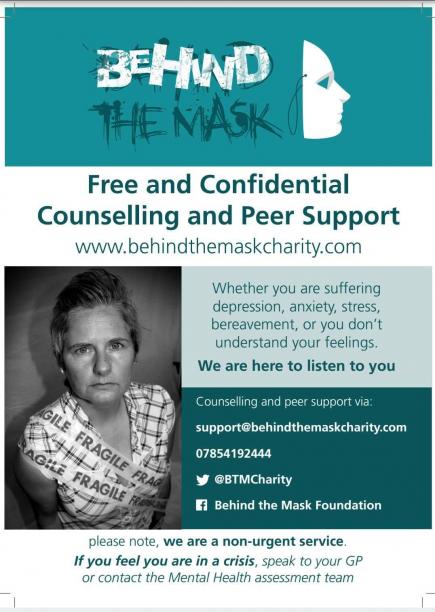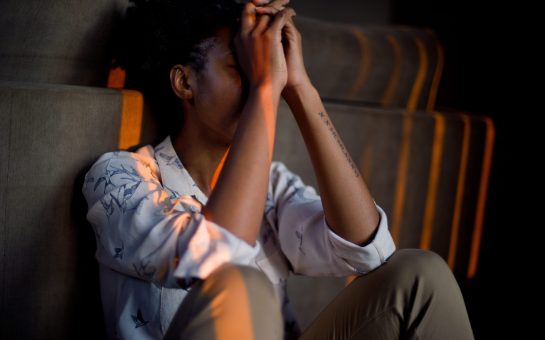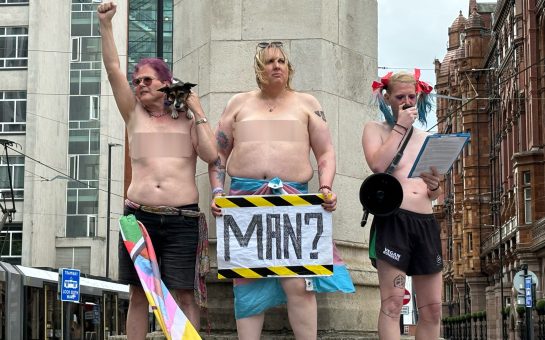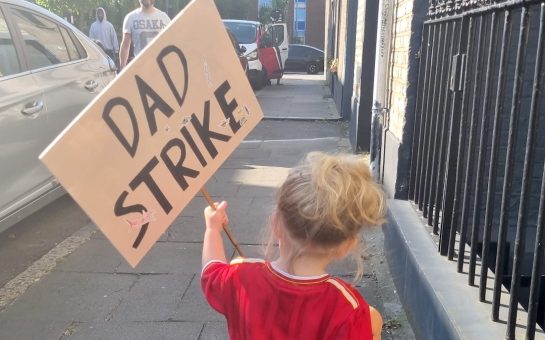While Christmas is many people’s favourite time of year, it can be particularly lonely for those with mental health problems.
As people gather together to celebrate with friends and family, the festivities can heighten their sense of isolation from the rest of society.
With one in four people set to experience some kind of mental health problem in the course of any given year, there is a high demand for support services.
Many mental health trusts have experienced budget cuts, however, and in November the King’s Fund revealed widespread evidence of poor-quality care.
Michelle Partington, a former RAF paramedic who suffered from post-traumatic stress disorder (PTSD), has launched a website to help people with mental health conditions.

BEHIND THE MASK: Michelle started the charity after her own experiences of PTSD
Her own experiences inspired her to set up the Behind the Mask foundation, and she has now launched a crowdfunder to expand the project and reach out to more people.
After returning from front-line duties in Afghanistan, Michelle found the support available from the Ministry of Defence did not meet all of her needs.
She told MM: “They were very good when I first got help, but as soon as they found out I was medically discharged they just left me to my own devices.
“I moved home to Manchester and they provided me with support, but I had to drive over two and a half hours away to get it.
“When you’re not sleeping very well and you’re on medication that makes you drowsy, it’s not safe to drive somewhere and it’s completely inappropriate, so I had to try and source my own help.
“With the waiting lists I thought ‘unless you go private you’re going to struggle to find something’ – which is why I set up the website.”
Although the support Michelle received from the NHS Pennine Care Trust was ‘very good’, she found it difficult to cope during the periods of time between appointments.
She eventually received help from the Speakmans – therapists and life coaches who have appeared on ITV’s This Morning programme.
Our founder @mitsanuk would like to wish everyone the best that this time of year can be for you. pic.twitter.com/o6nTIcWsKw
— Behind The Mask (@BTMCharity) December 20, 2015
“The treatment got me to a place where I could go outside,” Michelle said.
“Every time I went out I was having panic attacks, so they provided me with some therapy sessions that got rid of my anxiety and I could go out and do things again, which was great.
“I could then help other people in the same sort of place. And I’m not just helping people with PTSD – it’s people with any sort of mental illness.”
Like many people with mental health problems, Michelle experienced a lack of understanding about her condition that affected her social life.
She explained that people who haven’t experienced problems of their own may think it is easy to ‘just get over it’ – but conditions such as anxiety are a lot more complex than that.
The online service that Michelle has set up is able to overcome some of the barriers faced by people with mental health problems.
Those in need of immediate help can log in to one of the chat rooms and talk to a ‘peer’ who has experienced the same sort of problems in the past.
Volunteer counsellors, who are all fully qualified, are available between the hours of 6 and 10pm every evening and can be reached via Skype.

ON THE ROAD: The charity started as an online service, but is expanding its scope
The counsellors operate separately from the chat rooms and do not have access to the discussions, protecting the privacy of people receiving help.
Michelle says the online approach to treating mental health conditions can be just as effective as face-to-face methods.
“It gets rid of so many barriers,” she said.
“One, for people who can’t go out of the house and two, sometimes when you’re struggling with mental illness there’s embarrassment attached to it, so you tend to find that people will open up more because the embarrassment of being sat in front of somebody isn’t there.
“You can’t interpret body language, obviously, but when you’re trained you can kind of get to know the triggers, which way a conversation is going to go, so everybody’s trained in working online.
“Part of what we do is raising awareness, so I go out and do talks to various agencies to explain my story and where I came from, and how talking can open the door to them.
“So many people are suffering with mental health conditions but they keep quiet because they’re embarrassed.”
With Christmas only a few days away, Michelle says the festive season is causing difficulties for some individuals with mental health problems.
Thoughts that can take over you mind. Words spoken by others can rip you apart from the inside…. #mentalhealth pic.twitter.com/TIXPvXFJVP
— Behind The Mask (@BTMCharity) October 31, 2015
“People are saying they’re feeling lonely at this time of year because they haven’t got anybody,” she said.
“Some have lost loved ones and it’s the first time without them.
“It comes more to the fore when everybody’s celebrating, when everyone’s going to parties and they’re sat at home unable to go out or not in a position to go out.”
Although there is still a great deal of stigma attached to mental health problems, Michelle believes people are slowly becoming more accepting of them.
In the Autumn Statement, Chancellor George Osborne pledged an extra £600million to expand mental health services.
However, Michelle is not convinced that the situation will improve dramatically as a result of this funding injection.
“They give with one hand and they take away with the other,” she said.
“When people need admitting for help, they have to release the person that’s in the best place to be able to provide a bed for the one who needs it.
“Sometimes you’re not even in your own county when you’re admitted somewhere, so you don’t have the support of your family.

HOT MEALS: The charity has teamed up with the Pound Bakery to provide food for the homeless
“They’ve cut a lot of support for children as well – but if you deal with mental health conditions as early as possible, there’s more of a positive future for them.”
With seemingly no end to austerity in sight, online services such as those provided by the Behind the Mask Foundation could play vital role in supporting those with mental health conditions.
“What we want to provide is support for the people who can’t access our services online,” she said.
“Currently we’re going into Leigh with a vehicle that we’ve bought for the charity to provide tea and coffee and support facilities.
“We’ve got vouchers that we can give to the homeless so they can go out and get a meal – they come and have a coffee and a chat and they can then get food.
“Obviously we’re not funded, so everything comes through the crowdfunder.
“We’re always looking for peers and for counsellors. We just want enough to be able to give what we need to give.”
The Behind the Mask Foundation can be found here, and to support the crowdfunding project click here.



